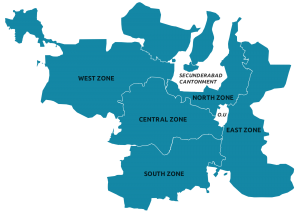Formation of MCH
In the year 1869, Municipal administration was first introduced for the city of Hyderabad. The city of Hyderabad was divided into four and the suburbs of Chaderghat were divided into five divisions. The whole management of both the city and the suburbs was handled by the then City Police Commissioner, Kotwal-e-Baldia.
In the same year, Sir Salar Jung-1, the then Prime Minister of Hyderabad State under the Nizam, has constituted the Department of Municipal and Road Maintenance. He also appointed a Municipal Commissioner for Hyderabad Board and Chaderghat Board. At that time, city was just 55 sq. kms with a population of 3.5 lakhs.
In 1886, the suburban area of Chaderghat was handed over to a separate officer and then Chaderghat became Chaderghat Municipality.
The first corporation
 In 1933, Chaderghat Municipality was merged with Hyderabad Municipality to form Hyderabad Municipal Corporation and was given statutory status under the Hyderabad Municipal Act. During the following year (1934), the first elections were held for Municipal Corporation and a Standing Committee was appointed at that time.
In 1933, Chaderghat Municipality was merged with Hyderabad Municipality to form Hyderabad Municipal Corporation and was given statutory status under the Hyderabad Municipal Act. During the following year (1934), the first elections were held for Municipal Corporation and a Standing Committee was appointed at that time.
Jubilee Hills Municipality
In the year 1937, Jubilee Hills Municipality was formed by the amalgamation of Jubilee Hills and Banjara Hills. Later, in 1942, the corporation status for the city has been removed due to some issues.
Secunderabad Municipality
In the year 1945, Secunderabad Municipality was formed. Again in 1950, Hyderabad regained its lost Corporation status along with the amalgamation of Jubilee Hills Municipality. During the same period, Secunderabad Municipality also attained the corporation status through the Hyderabad Corporation Act.
Muncipal Corporation of Hyderabad
Once again in 1955, both the municipal corporations of Hyderabad and Secunderabad were merged to form Municipal Corporation of Hyderabad (MCH).
Functions of MCH
- For the administrative purposes, Municipal Corporation of Hyderabad (MCH) was divided into 4 zones, 7 circles, 100 constitutional wards and 254 localities.
- MCH provided civic services and infrastructure facilities to the citizens of Hyderabad and Secunderabad. Maintenance of public streets, roads, public health and other issues relating to the sanitation and improvement of the city were handled by the corporation.
Evolution of GHMC
In a view to develop and provide eminent facilities to the people residing in the surrounding districts of Hyderabad, during the year 2007, MCH was merged with 12 municipalities and 8 gram panchayats from both Ranga Reddy and Medak districts to form Greater Hyderabad Municipal Corporation (GHMC).
Along with MCH, GHMC includes 10 Municipalities in Ranga Reddy district – L. B. Nagar, Gaddiannaram, Uppal Kalan, Malkajgiri, Kapra, Alwal, Qutubullapur, Kukatpally, Serilingampalle, Rajendranagar and 8 panchayats: Shamshabad, Satamarai, Jallapalli, Mamdipalli, Mankhal, Almasguda, Sardanagar and Ravirala and also 2 municipalities in Medak district – Ramachandrapuram and Patancheru.
With all these areas GHMC is divided into 5 zones (South, East, North, West and Central zones), 18 circles and 150 wards and covers an area of 650 sq. kms.
Suggested Reading:
GHMC – Constituencies and MLAs
GHMC – Zones, Circles and Wards
Know Your GHMC Corporator
